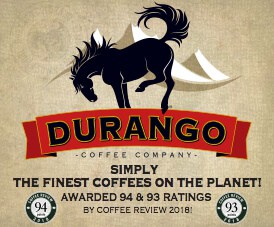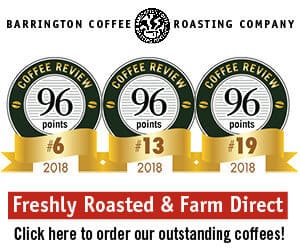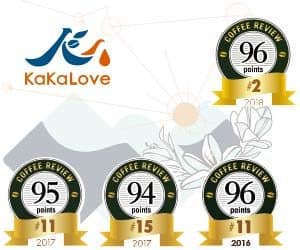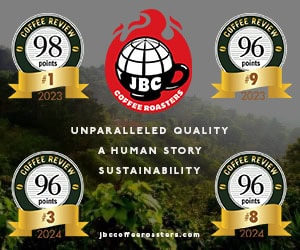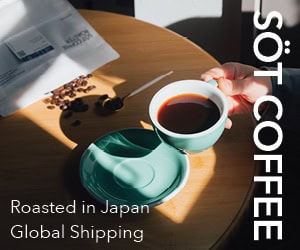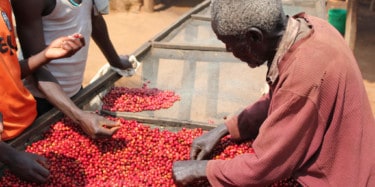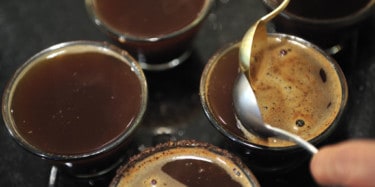This coffee is certified organically grown and certified fair trade, the latter meaning it was purchased at no less than a minimum price determined by the certifying agency to be economically sustainable for farmers. Produced by the Asociación de Productores Ecológicos de Planadas (ASOPEP) and Asociación de Agricultores y Productores de Café Especial de Montalvo (AGPROCEM) from trees of the
SEARCH RESULTS
Karimikui Espresso
Produced by members of the Rungeto Farmer’s Cooperative Society from trees of the heirloom SL28 and SL34, and recent hybrid Ruiru 11 and Batian varieties of Arabica. Despite grower discontent and urban encroachment on prime coffee lands, Kenya continues to produce some of the world’s most elegant and distinctive coffees. JBC Coffee Roasters’ vision is simple: “let the coffee lead the way” through
Tano Batak Sumatra
This coffee was grown by indigenous Batak people, who have been involved in coffee production since the practice was brought to Sumatra by the Dutch in the late 19th century. Coffees from the northern part of the Indonesian island of Sumatra are admired for their complex aromatic wood and fruit notes that appear to result largely from unorthodox fruit removal and drying practices called “wet
Tarime Tanzania
This coffee earned the highest rating in a cupping of coffees from the Great Lakes region of Africa for Coffee Review’s June 2018 tasting report. Produced from the admired Bourbon and Kent varieties of Arabica by smallholding farmers. This is a wet-processed or “washed” coffee, meaning the fruit skin and pulp were removed from the beans immediately after harvesting and before drying. JBC Coffee
African Great Lakes Coffees: Burundi, Rwanda, Uganda, Congo, Tanzania
The countries whose coffee regions nestle around the Great Lakes of Central Africa—Rwanda, Burundi, and key growing areas of Uganda, Tanzania, and the Democratic Republic of the Congo—make appearances in the news cycle more often for conflict than for coffee. But these countries are also longtime coffee-producing lands that have, within the last 10 years or so, emerged as important sources of
Kiniyota Espresso
Produced entirely of the heirloom Bourbon variety of Arabica and processed at the Gomba Washing Station, which works with 2831 registered farmers. JBC Coffee Roasters’ vision is simple: “let the coffee lead the way” through sourcing and roasting the best and most unique coffees available and rewarding the farmers who grow those coffees with substantial premiums. Visit www.jbccoffeeroasters.com or
Gedeb Espresso
Southern Ethiopia coffees like this one are produced from traditional Ethiopian varieties of Arabica long grown in the region. A wet-processed or “washed” coffee, meaning the fruit skin and pulp were removed from the beans immediately after harvesting and before drying. Like virtually all southern Ethiopia coffees, this coffee is produced by villagers on small, garden plots interplanted with food
Gaitania Espresso
Certified organically grown and produced by members of the the ASCI’SP cooperative from mixed varieties of Arabica. Processed by the conventional wet or “washed” method, in which skin and fruit flesh are removed from the beans or seeds before they are dried. JBC Coffee Roasters’ vision is simple: “let the coffee lead the way” through sourcing and roasting the best and most unique coffees available
Kiniyota Burundi
This exceptional coffee was selected as the No. 3 coffee on Coffee Review’s list of the Top 30 Coffees of 2018. Produced entirely of the heirloom Bourbon variety of Arabica and processed at the Gomba Washing Station, which works with 2831 registered farmers. JBC Coffee Roasters’ vision is simple: “let the coffee lead the way” through sourcing and roasting the best and most unique coffees available
Gaitania Colombia
Organic and fair trade certified. Produced by members of the the ASCI’SP cooperative from mixed varieties of Arabica, and processed by the conventional wet or “washed” method, in which skin and fruit flesh are removed from the beans or seeds before they are dried. JBC Coffee Roasters’ vision is simple: “let the coffee lead the way” through sourcing and roasting the best and most unique coffees
Bufcafe Rwanda Espresso
Produced from trees of the heirloom Bourbon variety of Arabica. Epiphanie Mukashyaka established the now famous Bufcafe washing station or wet mill following the Rwandan genocide and the loss of most of her family. She and her son now operate two wet mills and a dry mill in the area. Processed by the conventional wet or “washed” method, in which skin and fruit flesh are removed from the beans or
Bufcafe Rwanda
Produced from trees of local strains of the heirloom Bourbon variety of Arabica. Epiphanie Mukashyaka established the now famous Bufcafe washing station or wet mill following the Rwandan genocide and the loss of most of her family. She and her son now operate two wet mills and a dry mill in the area. Processed by the conventional wet or “washed” method, in which skin and fruit flesh are removed
Gedeb Ethiopia
Southern Ethiopia coffees like this one are produced from traditional Ethiopian varieties of Arabica long grown in the region. This is a wet-processed or “washed” coffee, meaning the fruit skin and pulp were removed from the beans immediately after harvesting and before drying. Like virtually all southern Ethiopia coffees, this coffee is produced by villagers on small, garden plots interplanted
Top 30 Coffees of 2017
We are pleased to present our list of the Top 30 Coffees of 2017, Coffee Review’s fifth annual ranking of the most exciting coffees we reviewed over the course of the past year. Coffee Review’s goal, as always, is to celebrate coffee roasters, farmers and mill-owners who make an extra effort to produce coffees that are not only superb in quality but also distinctive in character. In particular,
Ulos Batak Sumatra
Coffees from the northern part of the Indonesian island of Sumatra are admired for their complex earth and fruit notes that appear to result largely from unorthodox fruit removal and drying practices called “wet hulling.” This is a splendid example of the potential of the type. Ulos Batak is the name applied by the cooperative exporter Klasik Beans to a premium grade of its small-producer
Gaitania Colombia
Produced by the Resguardo Indigena Nasa We’sx indigenous community in Gaitania, Colombia, associated with the Paez and Nasa tribes of southern Cauca. From trees of the Castillo, Caturra, Colombia and Typica varieties of Arabica. This coffee is organic and Fair Trade certified, the latter meaning it was purchased from small-holding farmers at a “fair” or economically sustainable price. It is a
Top Value Coffees of 2017
Some readers seek coffees with the highest scores. Others look for great value. What if you want both? The coffees below were singled out on our 2017 list of Top Coffees by Category as the best value in 2017. As December 15, 2017, all six of these fine coffees are available for sale on the roasters' websites. Best Values - Espressos No. 13 Red Rooster Coffee Roaster, Flight Seasonal
Gikanda Kenya
Despite grower discontent and urban encroachment on prime coffee lands, Kenya continues to produce some of the world’s most elegant and distinctive coffees. JBC Coffee Roasters’ vision is simple: “let the coffee lead the way” through sourcing and roasting the best and most unique coffees available and rewarding the farmers who grow those coffees with substantial premiums. Visit
Top Coffees by Category – 2017
In the past, our Top 30 Coffees lists tended to favor high-scoring coffees produced from botanical varieties of Arabica with striking sensory properties such as Geshas, coffees from the distinctive traditional Ethiopian varieties, Kenyan coffees, and so on. In 2015, we began the practice of recognizing coffees by category to focus attention on fine coffees from other parts of the world and/or
El Aquila Pacamara Espresso
Produced from trees of the much admired, bold-bean Pacamara variety of Arabica, a cross between the giant-beaned Maragogipe variety and Pacas, a selection of the heirloom Bourbon, and processed by the wet or washed method (fruit skin and pulp are removed before drying) by grower Ricardo Ariz. JBC Coffee Roasters’ vision is simple: “let the coffee lead the way” through sourcing and roasting the


